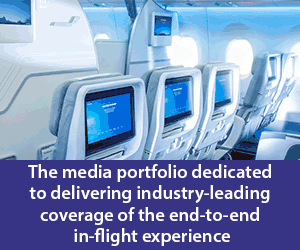
The Crystal Cabin Awards, which celebrate innovation and excellence within the aircraft cabin, were held in person again this year on Tuesday evening 14 June. A jury of industry experts selected eight winners during an in-depth final viewing and the winners were announced during an exclusive awards ceremony and gala dinner in Hamburg.
The Cabin Concepts Category was won by Teague and NORDAM’s Elevate concept. The visually arresting design uses floating furniture attached to wall braces to give a freer, more organic and more immersive feel than comparable premium accommodation concepts for single aisle aircraft. The key driver behind the approach was to offer the privacy and exclusivity of the wide-body premium experience to narrow-body airliner passengers.
Caeli Nova’s Cordillera system won the Cabin Systems category. The system is designed to disrupt the established processes and protocols and allow airlines to open direct routes over mountain ranges by extending the time aircraft can fly at high altitude after a decompression incident from 22 to 180 minutes. This is a potential game-changer for airlines that have until now had to circumvent high terrain such as the Himalayas, Rockies or Andes. One route that would become widely available using Cordillera is airway L888, which crosses the Himalayas and is 30 minutes quicker than other routes between Europe and parts of Asia.
Safran Cabin’s “Fire Resistant Cargo Container” was the judges’ first choice in the Health and Safety category. Lithium-ion battery fires are a fairly new, but highly dangerous threat. Safran Cabin’s solution wowed the jury by offering fire containment for Class D fires for up to six hours, the maximum distance aircraft are allowed to fly from an airport. The device gives passengers, crew and operators an additional level of protection from a threat that has the potential for catastrophic consequences during flight.
Winner of the Passenger Comfort category, Collins Aerospace’s SpaceChiller, is a personal refrigeration unit for individual passengers or larger areas of the aircraft cabin eschews traditional air-cooling technologies. SpaceChiller requires half the power of traditional designs and its modular architecture offers a premium passenger experience and gives airlines added flexibility for services and crew workspace. Conceived primarily for premium seat classes, SpaceChiller can be scaled in size as required, another factor that impressed the jury.
IFEC & Digital Services category was won by Anuvu and Southwest Airlines’ new system called Dedicated Space. The system promises a five-fold increase in available personal bandwidth and a dramatic reduction in latency. Along with faster downloads and uploads, passengers are promised more stable in-flight connectivity with the new system.
Winner of Material & Components, Thales Avionics’ Pulse, is a charging solution for aircraft cabins that uses patented power management technology to dynamically allocate power during the flight. The slim, low-weight power supply unit lets passengers recharge their device in flight via USB-A, USB-C or wireless connection, taking away charge anxiety and letting travellers enjoy their device at any point during their journey.
Crystal Cabin awards organisers say that the competition’s Sustainable Cabin category was a hotbed of activity this year, and the top honour in this category was claimed by Swedish manufacturer Diab in cooperation with AkzoNobel, Rescoll and Roctool. The group has pioneered a thermoplastics manufacturing process to produce 100% recyclable panels for cabin interiors. Among the aspects that particularly impressed the jury were overall reduction in life cycle cost and lower environmental impact by facilitating recycling of cabin elements. The process developed by Diab and its partners is not only more eco-friendly but also faster than methods using adhesive films. The thermoplastic sheets are welded directly to the foam core which also offers improved acoustic insulation for the finished material. 3D-shaped and decorated panels can be produced in a one-step process, resulting in components that are lighter and cheaper to produce.
Finally, the winner of the University category this year was Ken Kirtland from the Georgia Institute of Technology. His idea for a new type of airline featuring electric aircraft convinced the jury with its unique approach to sustainable air travel. The focus of the concept is to use underused regional airports in a fascinating departure from traditional hub-and-spoke concepts for air networks. The portal envisages a new type of zero-emission electric-powered aircraft to ferry passengers between local hubs; the plane would have a range of 1,000 miles and accommodate 30+ passengers. The layout of the Portal cabin was another aspect that drew the jury’s admiration. The cabin features all-premium seating with panoramic window views.
Congratulations to all the winners!





